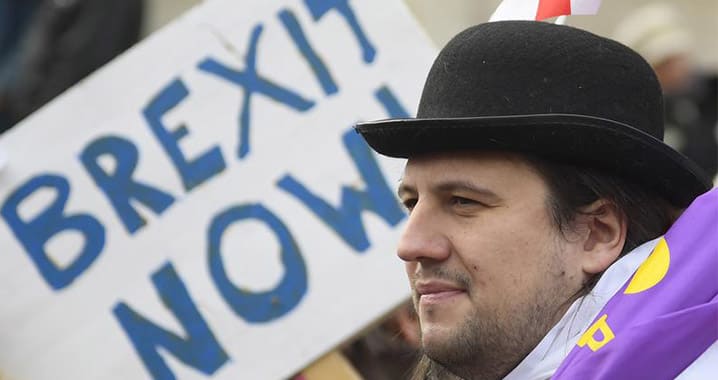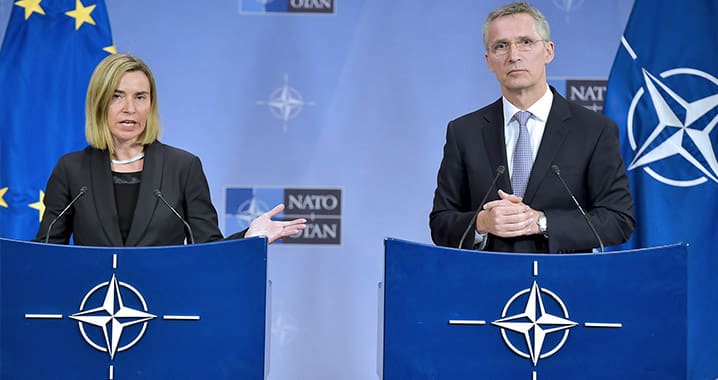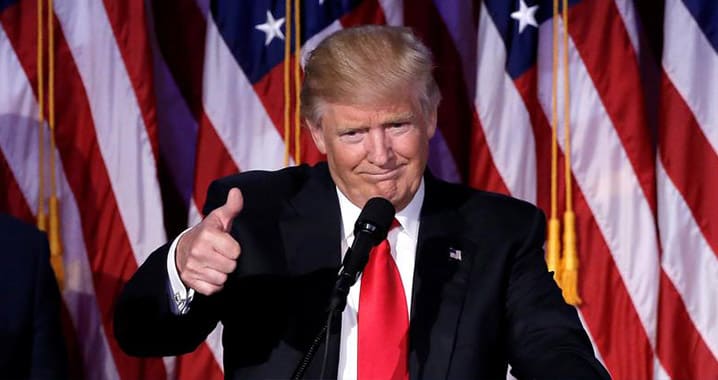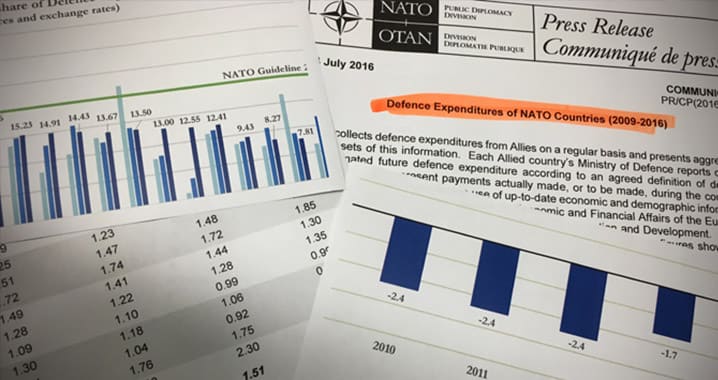Anti-establishment populism is undeniably on the rise across the West. From Donald Trump’s election pledge to “drain the swamp” in Washington, through Brexit, to the ascendancy of movements such as Italy’s Five Stars on the left and Germany’s Alternative für Deutschland on the right, a rejection of old orthodoxies and with them political elites and institutions is proving a powerful appeal.
One can debate the causes, and clearly there are different specifics in play in Europe compared with the United States, and even various parts of Europe. What is clear, though, is that Moscow is eagerly encouraging this wave not just because it is challenging the premises of the post-1945 values-based liberal international order, but also because it is poses real security threats to Europe.
European Union torn
Although it is easy to decry the European Union for its elephantine procedures and Byzantine politics, it is also a fundamental element of the security architecture of the continent. Part of its particular challenge is that it is not only victim of the populist wave, it is also cause.

For the most ardent federalists in Brussels, Brexit means this is a time to push further and faster with EU integration; to those already sceptical, it frees them to consider more “exits”. © REUTERS
A powerful driver has been a perceived—and not entirely unjustified—belief that a Brussels elite is committed to a project of political unification out of step with the interests and ambitions of national constituencies. Although the twists and turns of the post-referendum British politics are not especially enlightening (“Brexit means Brexit” hardly provides much of a blueprint), nonetheless the prospect of a withdrawal of the United Kingdom from the EU has worsened the problem. For the most ardent federalists in Brussels, the self-exclusion of their most intransigent opponent means this is a time to push further and faster. To those already sceptical, though, this frees them to consider more “exits”.
This is more than just a political and economic issue. If there is one crucial lesson in the current discussions about Russia’s way of war—whether we call it hybrid, non-linear, or asymmetric—it is that conflict in the twenty-first century is just as much fought in the realms of politics, morale, economics and governance, as on the battlefield. While NATO remains the indispensable military alliance, the EU could play an invaluable role in all those domains rightly outside NATO’s remit.

The wave of populism has wider security implications and poses challenges to both the EU and NATO as values-based organisations. © NATO
The EU is already developing its security role, although to a considerable extent this is still at the declaratory rather than operational level. Parallel European command structures need not duplicate or undermine NATO—though they could, and hence Moscow’s enthusiasm for them. But they also represent a long-term initiative more about reaffirming federalist impulses than strengthening forces on the ground.
Especially as it faces the loss of the United Kingdom—with Europe’s biggest military budget—the EU needs to focus on two, parallel priorities: firstly, increased “non-kinetic” security, improving common counter-intelligence and financial and political protection measures; secondly, encouraging member states to devote adequate resources to their own national militaries. However, if the EU breaks apart or simply pales into irrelevance, then individual nations will in the main be far less willing and able to address these needs.
NATO in the middle
NATO is facing different challenges than the European Union. Although regularly a target of choice among populists, including France’s Marine Le Pen, there is generally less of a movement to see nations withdraw or the Alliance disbanded. Rather, the debates focus on whether prospective new members, notably Sweden and Finland, really ought to join, and the willingness of nations to raise their defence budgets to the 2% of Gross Domestic Product (GDP) that NATO considers the basic minimum. Indeed, some populists of the right such as Poland’s governing Law and Justice Party are vehement supporters of the Alliance. (Not only has Poland already reached the 2% level, it is committed to exceeding it.)
The European populist challenge to NATO is therefore more often operational than existential. There are those, especially on the Mediterranean rim, who regard the greater threat as coming from the Middle East and North Africa rather than Russia, and who question the present emphasis on Baltic Air Policing and forward deployments along the eastern border.
More often, the mood is rather one of self-sufficiency. In a 2016 Pew Research Centre survey, many European countries had a clear majority—83% in Greece, 77% in Hungary, 67% in Italy and 65% in Poland—feeling that other countries should be left to deal with their own problems. It can hardly be a coincidence that populist governments are in place in three of the four, while in Italy, Five Stars is, as of writing, neck-and-neck in the polls with the Democratic Party. The populist message is essentially hostile to alliances and mutual commitments.

On the campaign trail, Donald Trump was sceptical about an “obsolete” NATO, while expressing his commitment to the Alliance at other occasions. © REUTERS
Of course, it remains to be seen what the US populist challenge may be. On the campaign trail, Donald Trump was sceptical about an “obsolete” NATO and in particular any US commitment to protect members which fail to contribute what he considers adequately to their own defence. On the other hand, he expressed his commitment to NATO at other occasions, and he is constrained by a Congress and a government apparatus which are overwhelmingly supportive of a continued and positive US role in the Alliance. Realistically, the populist threat to NATO from across the Atlantic is not withdrawal but rather apathy: a US government which sees its real advantage to be found in bilateral relations—possibly even with Russia—rather than multilateral engagement.
Silver linings
As the British are discovering, it is easier to pledge disengagement than to accomplish it. Furthermore, not every campaign pledge will ever become policy, especially if it risks reversing decades of policy. If anything, it is important not to succumb to a sense of cumulative helplessness: nothing is more corrosive than letting the discussion move from whether these alliances face dissolution to how best to manage the process.
Besides which, it is also perversely possible that the new challenges may be productive in the long run. The challenge to NATO is forcing the Alliance to sharpen its message about its value to all its members. Furthermore, without easy guarantees from the United States, European countries will have to be more serious about their own defence. (Of the 28 nations currently in the European Union, 22 are also members of NATO.) The EU has an aggregate GDP of just under $17 trillion, only a little more than a trillion dollars less than that of the United States. Yet the difference in military budgets is disproportionate: the EU spends an aggregate of around $219 billion compared with the United States’ $618.7 billion.
Clearly, Europe would be able to meet the shortfall created by any US downscaling of its support, but this would not be necessary, especially not to deal with a Russia able to spend only $43 billion on its military. (Of course, the parallel is not direct, not least because an authoritarian regime can do more with less—but not that much more.)

Without easy US guarantees, European countries will have to be more serious about their own defence and increase their military spending. (Defence expenditures of NATO countries, 2009-2016) © NATO
In any case, what is at issue is not simple soldier-for-soldier arithmetic. As noted above, modern “non-linear” security challenges are as much about governance as firepower. Using a variety of non-kinetic methods, from espionage and hacking, to disinformation and covert funding of useful political movements, Moscow is seeking to open existing fault lines within both NATO and the EU. Populist movements are often among their allies and tools of choice, given their rejection of existing institutions, norms, and even the fundamental understandings of the modern global system.
If the EU opts to pretend that its survival is simply a matter of better public relations, or of redoubled federalism, then it faces a questionable future. However, one way it could reaffirm its relevance is as a powerful force helping member states defend themselves against non-kinetic challenges. If handled properly, this could be a case study of how the EU can create synergies and support its members rather than seek to impose a Brussels perspective. In the process, it would not only enhance European security and deter Russian aggression, it could also deprive the populists of some of their anti-EU ammunition.
There is no questioning the populist challenge to the institutions of the West, including NATO and the European Union. However, the overused cliché, of a challenge also being an opportunity in disguise, is for once true. By addressing the populist critiques, both organisations can further renew themselves and in the process strengthen Western security in an age of political, at least as much as military, threats.
